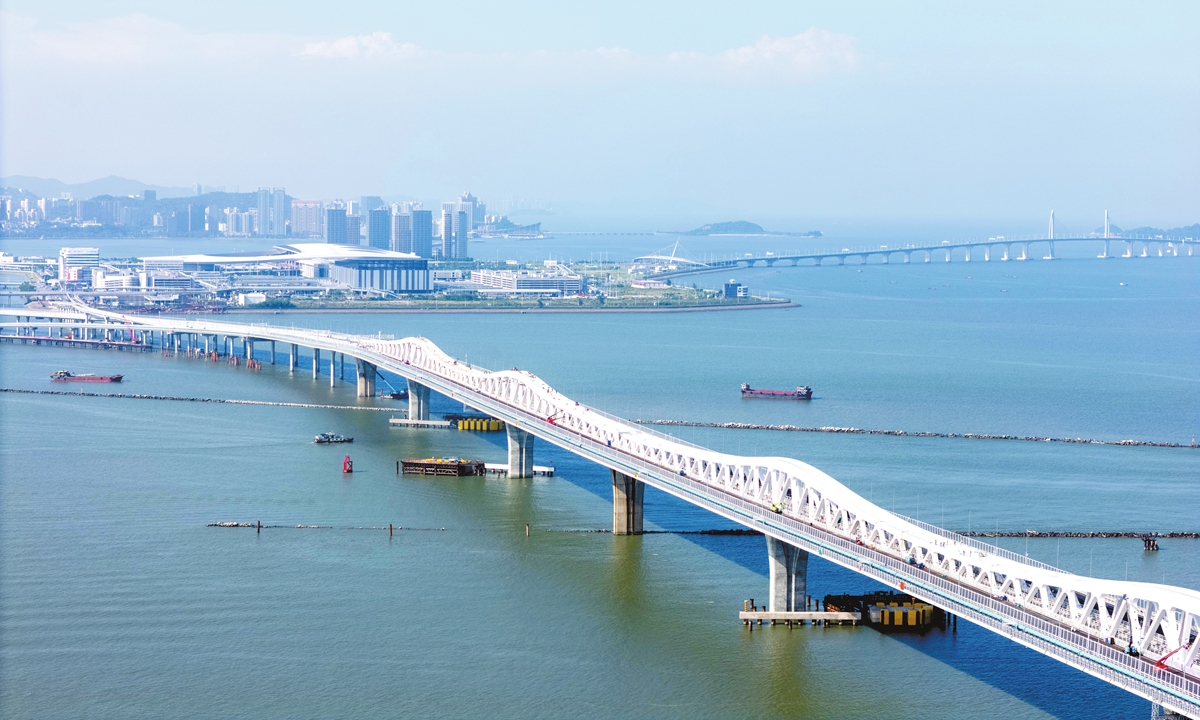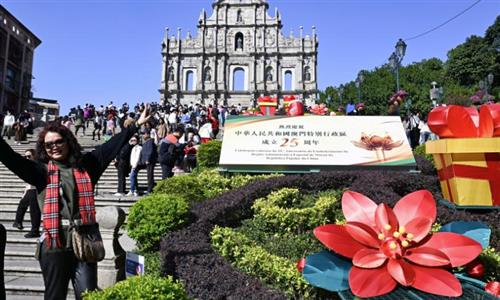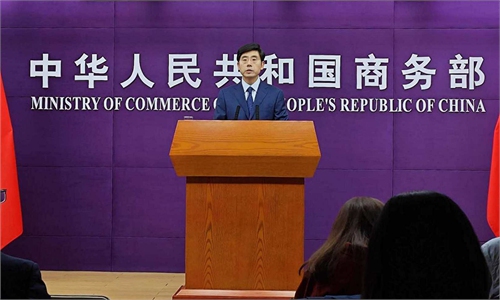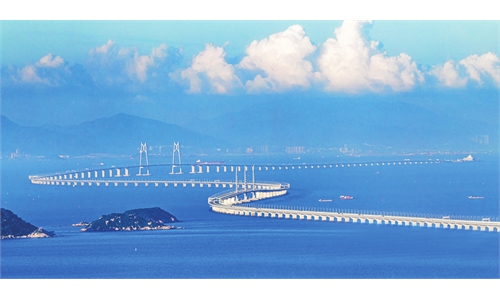Macao plays unique role in deepening regional integration
City’s participation in GBA advancement and BRI provides new opportunities for growth
Editor's Note:
This year is deemed pivotal for high-quality development of China-proposed Belt and Road Initiative (BRI), which has just celebrated its 11th anniversary. What are the major advancements BRI has made despite rising volatility in the world? And what role has the initiative played in facilitating regional growth and strengthening the global economy? As 2024 draws to a close, the Global Times is publishing a series of articles scoping the journey of BRI throughout the year. This is the second installment of the series.

In the past 25 years since Macao's returning to motherland, achievements have been made with continuous promotion of economic and trade exchanges and cooperation between the mainland and Macao Special Administrative Region (SAR), helping the city develop its economy, improving people's livelihood, and better integrating into the overall national development, said an official from the Ministry of Commerce (MOFCOM) on Thursday, in reviewing the economic and trade achievements between the two sides over the years.
In terms of goods trade, the mainland has implemented zero tariffs on products originating from Macao, supporting the development of Macao's traditional industries. In 2023, the trade volume between the mainland and Macao reached $3.84 billion, a 4.3-fold increase from 1999, the MOFCOM official said.
When it comes to trade in services, the number of tourists from the mainland to Macao has grown significantly with the introduction of the Individual Travel Scheme under the Closer Economic Partnership Arrangement, the official said.
Reflecting on these achievements, Li Xiaobin, a Macao studies expert at Nankai University in Tianjin, told the Global Times that Macao's integration into the development of Guangdong-Hong Kong-Macao Greater Bay Area (GBA) and its contributions to the BRI have created new growth opportunities for the city.
As the city is marking its 25th anniversary of return to the motherland on Friday, the special role of the city is once again highlighted for its regional integrated development with the nation offering the SAR greater prospects for future prosperity, Li said.
Integrated development
In recent years, Macao has fully leveraged the advantages of being "backed by the motherland and connected to the world," and achieving notable results.
One notable change is the emerging of new infrastructures under the supports of mainland companies.
Just two months ago, Macao had its first eight-lane bridge inaugurated, as a project that marks the 25th anniversary of the city's return to the motherland. The bridge, connecting the Macao Peninsula and Taipa, constitutes an additional route for travelers using the Hong Kong-Zhuhai-Macao Bridge to reach Taipa and Cotai.
China Civil Engineering Construction Corporation (CCECC), one of the companies participating in the bridge's construction, said in a statement sent to the Global Times that the new route is around three kilometers shorter than the one via the Ponte de Amizade (Bridge of Friendship), saving about three to six minutes of driving time.
The company noted its pivotal role in enhancing Macao's connectivity within the GBA and beyond Macao and supporting the SAR's better integration into the national development framework, CCECC said in the statement.
This project is just an epitome of Macao's active participation in and integration of the national development.
Hengqin in South China's Guangdong Province and Macao are separated only by a narrow body of sea, with the two regions within sight of each other. In recent years, the number of people commuting between Hengqin and Macao for work and study has steadily increased. As of November 21, the Hengqin Port had recorded more than 20 million passenger crossings this year, underscoring the growing demand for seamless regional mobility.
Very recently, a light rail transit line linking Macao with Hengqin has entered into operation, another flagship infrastructure project that serves as one of the commemorative projects marking the 25th anniversary of return to the motherland.
The transit line begins at the Lotus Station within Macao and ends at Hengqin Station in Hengqin Port. The project contributes to the integration of Macao and Hengqin into the "one-hour living circle" of the GBA.
Macao's integration into the GBA extends beyond transportation. For example, PowerChina has built more than 80 waste-to-energy projects in the area, including Macao, with a designed daily processing capacity of 116,300 tons of domestic waste, the company told the Global Times.
Greater connectivity
The deep integration with the development of motherland has not only provided Macao with opportunities to directly benefit from mainland's economic growth but also helped it enhance its greater connectivity with the world, particularly through the joint construction of the BRI, Li said.
Macao has gained benefits from being an active player of the BRI, exemplified by the robust trade growth. In 2023, the value of goods exported from Macao to the BRI participating countries reached 770 million patacas ($96.32 million), marking a year-on-year increase of 47.8 percent, while imports from BRI countries totaled 30.92 billion patacas, according to a recent bluebook on the GBA.
"Macao's industries were relatively single due to historical reasons, and its role in the global economy was also limited... The fruition of the BRI has brought new vitality to Macao in terms of diversifying its industries," Li said, noting that Macao's unique role in building connectivity between Portuguese-speaking countries and mainland also means more possibilities for its future development.
As the nation takes a leading role in this wave of globalization, Macao should seize the opportunities by further integrating with the motherland's development, particularly in booming sectors such as technological innovation, finance and green energy, to achieve sustainable and enhanced growth, Li said.
This year is deemed pivotal for high-quality development of China-proposed Belt and Road Initiative (BRI), which has just celebrated its 11th anniversary. What are the major advancements BRI has made despite rising volatility in the world? And what role has the initiative played in facilitating regional growth and strengthening the global economy? As 2024 draws to a close, the Global Times is publishing a series of articles scoping the journey of BRI throughout the year. This is the second installment of the series.

A view of the Macao Bridge on December 16, 2024 Photo: VCG
In the past 25 years since Macao's returning to motherland, achievements have been made with continuous promotion of economic and trade exchanges and cooperation between the mainland and Macao Special Administrative Region (SAR), helping the city develop its economy, improving people's livelihood, and better integrating into the overall national development, said an official from the Ministry of Commerce (MOFCOM) on Thursday, in reviewing the economic and trade achievements between the two sides over the years.
In terms of goods trade, the mainland has implemented zero tariffs on products originating from Macao, supporting the development of Macao's traditional industries. In 2023, the trade volume between the mainland and Macao reached $3.84 billion, a 4.3-fold increase from 1999, the MOFCOM official said.
When it comes to trade in services, the number of tourists from the mainland to Macao has grown significantly with the introduction of the Individual Travel Scheme under the Closer Economic Partnership Arrangement, the official said.
Reflecting on these achievements, Li Xiaobin, a Macao studies expert at Nankai University in Tianjin, told the Global Times that Macao's integration into the development of Guangdong-Hong Kong-Macao Greater Bay Area (GBA) and its contributions to the BRI have created new growth opportunities for the city.
As the city is marking its 25th anniversary of return to the motherland on Friday, the special role of the city is once again highlighted for its regional integrated development with the nation offering the SAR greater prospects for future prosperity, Li said.
Integrated development
In recent years, Macao has fully leveraged the advantages of being "backed by the motherland and connected to the world," and achieving notable results.
One notable change is the emerging of new infrastructures under the supports of mainland companies.
Just two months ago, Macao had its first eight-lane bridge inaugurated, as a project that marks the 25th anniversary of the city's return to the motherland. The bridge, connecting the Macao Peninsula and Taipa, constitutes an additional route for travelers using the Hong Kong-Zhuhai-Macao Bridge to reach Taipa and Cotai.
China Civil Engineering Construction Corporation (CCECC), one of the companies participating in the bridge's construction, said in a statement sent to the Global Times that the new route is around three kilometers shorter than the one via the Ponte de Amizade (Bridge of Friendship), saving about three to six minutes of driving time.
The company noted its pivotal role in enhancing Macao's connectivity within the GBA and beyond Macao and supporting the SAR's better integration into the national development framework, CCECC said in the statement.
This project is just an epitome of Macao's active participation in and integration of the national development.
Hengqin in South China's Guangdong Province and Macao are separated only by a narrow body of sea, with the two regions within sight of each other. In recent years, the number of people commuting between Hengqin and Macao for work and study has steadily increased. As of November 21, the Hengqin Port had recorded more than 20 million passenger crossings this year, underscoring the growing demand for seamless regional mobility.
Very recently, a light rail transit line linking Macao with Hengqin has entered into operation, another flagship infrastructure project that serves as one of the commemorative projects marking the 25th anniversary of return to the motherland.
The transit line begins at the Lotus Station within Macao and ends at Hengqin Station in Hengqin Port. The project contributes to the integration of Macao and Hengqin into the "one-hour living circle" of the GBA.
Macao's integration into the GBA extends beyond transportation. For example, PowerChina has built more than 80 waste-to-energy projects in the area, including Macao, with a designed daily processing capacity of 116,300 tons of domestic waste, the company told the Global Times.
Greater connectivity
The deep integration with the development of motherland has not only provided Macao with opportunities to directly benefit from mainland's economic growth but also helped it enhance its greater connectivity with the world, particularly through the joint construction of the BRI, Li said.
Macao has gained benefits from being an active player of the BRI, exemplified by the robust trade growth. In 2023, the value of goods exported from Macao to the BRI participating countries reached 770 million patacas ($96.32 million), marking a year-on-year increase of 47.8 percent, while imports from BRI countries totaled 30.92 billion patacas, according to a recent bluebook on the GBA.
"Macao's industries were relatively single due to historical reasons, and its role in the global economy was also limited... The fruition of the BRI has brought new vitality to Macao in terms of diversifying its industries," Li said, noting that Macao's unique role in building connectivity between Portuguese-speaking countries and mainland also means more possibilities for its future development.
As the nation takes a leading role in this wave of globalization, Macao should seize the opportunities by further integrating with the motherland's development, particularly in booming sectors such as technological innovation, finance and green energy, to achieve sustainable and enhanced growth, Li said.




